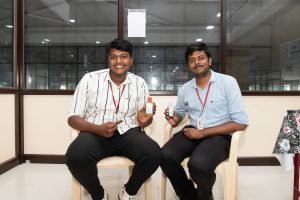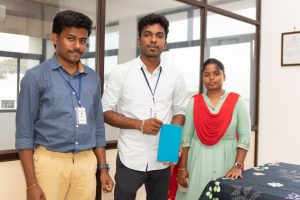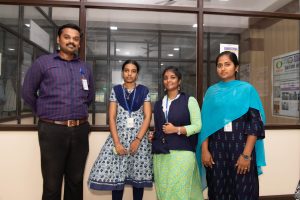One of the world’s best research and development centres, established for accomplishing and exploring innovation in Science and Technology at the university environment.
About 220 faculty members are with PhD qualifications and International research centre established (some major equipment -Scanning Electron Microscope EVO18 (CARL ZEISS), Energy Dispersive X-ray-Spectrometer Quantax 200 with X Flash® 6130, X-ray diffractometer D8 Advance ECO, Fourier Transform Infrared Spectrophotometer IR Tracer 100, Atomic Absorption Spectrophotometer AA 7000) by the institute plays a vital role in promoting the research culture among the faculty members and students in the campus which resulted more than 40 sponsored research projects worth of 14.5 Crore are ongoing from the Funding agencies such as DST, ICMR, DRDO, MSME, ATAL and four international research projects in collaboration with Poland, Norway, Malaysia and Thailand and more than 2500 research findings of our faculty members and students are published in the Scopus indexed journals.
This impacted the strong track record of Kalasalingam in terms of research collaborations, funding, publications and patents and the constant existence of Kalasalingam in the top lists of SIR (SCIMAGO Institutions Ranking). It has been in the history of Kalasalingam to be recognised and awarded with a unique centre of excellence since the year 2000 – TIFAC CORE sponsored Network engineering, Centre for Advanced Research in Discrete Mathematics (n-CARDMATH) Funded by DST, International Collaborative Project with the Cracow University of Technology for Sustainable Materials, King Mongkut’s University of Technology North Bangkok, Thailand for 3D printed flexible optical fibres using biodegradable PHBV/ Graphene Nanocomposites for Biophotonics applications, Resilient and optimal micro energy-grid (ROME), Universiti Teknologi Petronas Biological Treatment of Hazardous Sludge from Petroleum Refinery Industry shows the involvement of Kalasalingam in developing Science & Technology and Nation Building.
485
7743
113
33
110
Establishment of National Centre for Advanced Research in Discrete Mathematics (DST sponsored)
Establishment of International Research Centre
Establishment of TIFAC-CORE Network Engineering (Govt.-Industry-Institution Collaboration)
Publication of AKCE International Journal of Graphs and Combinatorics. Jointly published by Elsevier from 2015 onwards. Indexed in SCOPUS from 2011 onwards.
KARE provides the option for the faculty members to apply their scientific knowledge and technological innovations to a real-time problem faced by industry. To accomplish this task, the faculty members can utilize the university’s resources through proper agreements as per the protocol. In general, KARE faculty members may perform up to 35 days of consultancy over an academic year as part of the contractual allowance for 35 days of research and scholarly activity. This period can be extended with proper approval, provided the proposed consultancy contract provides enhancement of knowledge and brings recognition to the university. At the end of the project or in between, the faculty member can apply to claim a proportion of the income generated from university consultancy that may be taken as an incentive.


